J&K's Kot Bhalwal to have NAFED-developed Integrated Solid Waste Management Project in 2 years
15 Feb 2021 14:26:31
Jammu, Feb 15: The Administrative Council of the UT of Jammu and Kashmir has approved the establishment of an Integrated Solid Waste Management (ISWM) project in Kot Bhalwal , that the National Agriculture Cooperative Marketing Federation of India (NAFED) has undertaken. NAFED will establish a scientific system for waste management in Kot Bhalwal, at the estimated project cost of Rs 74.41 crore and a project timeline of 2 years.

Also read: Disengagement in Ladakh: A good beginning; more needs to be done
In order to implement the project, the Jammu Municipal Corporation (JMC) is to sign an agreement with NAFED and set up a 350 MT capacity Integrated Solid Waste Management plant along with an ancillary bio-CNG generating plant and bio-landfill at Jammu's Kot Bhalwal.
At the estimated project cost of Rs 74.41 crore and project timeline of 2 years, NAFED will establish a scientific system for waste segregation, processing, and disposal of effluents, emissions, and bio-degradable waste according to the norms of the Jammu and Kashmir Pollution Control Board. According to agreement, the JMC will contribute Rs 20 crore towards project execution, and will have a share in 50 per cent profit, on returns above 20 per cent of equity investment.
The project is significant for the development of the UT, since after being operationalized, it will check the polluting effect of unscientific disposal of municipal solid waste in water bodies, canals, and landfills, and ensure its sustainable and scientific disposal, besides generating non-conventional renewable energy in the form of Compressed Natural Gas.
According to UNEP, Integrated Solid Waste Management refers to the strategic approach to sustainable management of solid wastes covering all sources and all aspects, including generation, segregation, transfer, sorting, treatment, recovery and disposal in an integrated manner, with an emphasis on maximizing resource use efficiency.
Cleaner and safe neighborhoods, higher resource use efficiency, resource augmentation, savings in waste management costs due to reduced levels of final waste for disposal, better business opportunities and economic growth, local ownership and participation are the primary benefits of ISWM projects.
